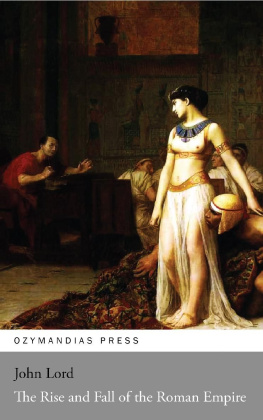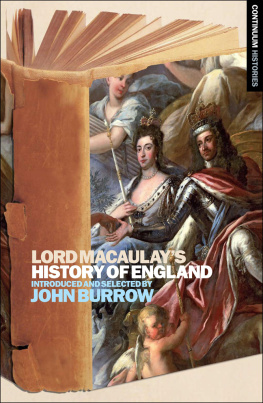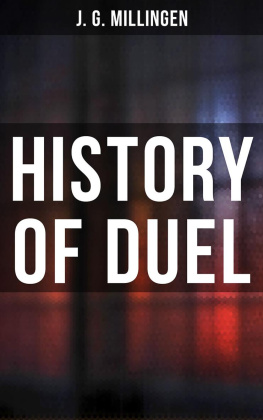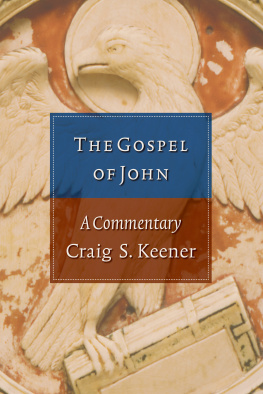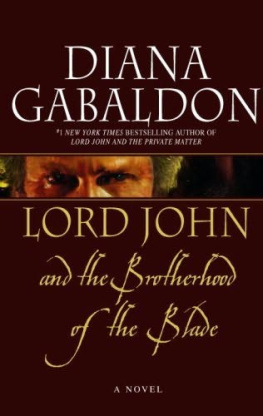John Lord - Beacon Lights of History (All 14 Volumes)
Here you can read online John Lord - Beacon Lights of History (All 14 Volumes) full text of the book (entire story) in english for free. Download pdf and epub, get meaning, cover and reviews about this ebook. year: 2018, publisher: Seltzer Books, genre: Religion. Description of the work, (preface) as well as reviews are available. Best literature library LitArk.com created for fans of good reading and offers a wide selection of genres:
Romance novel
Science fiction
Adventure
Detective
Science
History
Home and family
Prose
Art
Politics
Computer
Non-fiction
Religion
Business
Children
Humor
Choose a favorite category and find really read worthwhile books. Enjoy immersion in the world of imagination, feel the emotions of the characters or learn something new for yourself, make an fascinating discovery.
Beacon Lights of History (All 14 Volumes): summary, description and annotation
We offer to read an annotation, description, summary or preface (depends on what the author of the book "Beacon Lights of History (All 14 Volumes)" wrote himself). If you haven't found the necessary information about the book — write in the comments, we will try to find it.
Beacon Lights of History (All 14 Volumes) — read online for free the complete book (whole text) full work
Below is the text of the book, divided by pages. System saving the place of the last page read, allows you to conveniently read the book "Beacon Lights of History (All 14 Volumes)" online for free, without having to search again every time where you left off. Put a bookmark, and you can go to the page where you finished reading at any time.
Font size:
Interval:
Bookmark:
Christianity not progressive
Jewish monotheism
Religion of Egypt
Its great antiquity
Its essential features
Complexity of Egyptian polytheism
Egyptian deities
The worship of the sun
The priestly caste of Egypt
Power of the priests
Future rewards and punishments
Morals of the Egyptians
Functions of the priests
Egyptian ritual of worship
Transmigration of souls
Animal worship
Effect of Egyptian polytheism on the Jews
Assyrian deities
Phoenician deities
Worship of the sun
Oblations and sacrifices
Idolatry the sequence of polytheism
Religion of the Persians
Character of the early Iranians
Comparative purity of the Persian religion
Zoroaster
Magism
Zend-Avesta
Dualism
Authorities
Antiquity of Brahmanism
Sanskrit literature
The Aryan races
Original religion of the Aryans
Aryan migrations
The Vedas
Ancient deities of India
Laws of Menu
Hindu pantheism
Corruption of Brahmanism
The Brahmanical caste
Character of the Brahmans
Rise of Buddhism
Gautama
Experiences of Gautama
Travels of Buddha
His religious system
Spread of his doctrine
Buddhism a reaction against Brahmanism
Nirvana
Gloominess of Buddhism
Buddhism as a reform of morals
Sayings of Siddrtha
His rules
Failure of Buddhism in India
Authorities
Greek myths
Greek priests
Greek divinities
Greek polytheism
Greek mythology
Adoption of Oriental fables
Greek deities the creation of poets
Peculiarities of the Greek gods
The Olympian deities
The minor deities
The Greeks indifferent to a future state
Augustine view of heathen deities
Artists vie with poets in conceptions of divine
Temple of Zeus in Olympia
Greek festivals
No sacred books among the Greeks
A religion without deities
Roman divinities
Peculiarities of Roman worship
Ritualism and hypocrisy
Character of the Roman
Authorities
Youth of Confucius
His public life
His reforms
His fame
His wanderings
His old age
His writings
His philosophy
His definition of a superior man
His ethics
His views of government
His veneration for antiquity
His beautiful character
His encouragement of learning
His character as statesman
His exaltation of filial piety
His exaltation of friendship
The supremacy of the State
Necessity of good men in office
Peaceful policy of Confucius
Veneration for his writings
His posthumous influence
Lao-tse
Authorities
Early progress of philosophy
The Greek philosophy
The Ionian Sophoi
Thales and his principles
Anaximenes
Diogenes of Apollonia
Heraclitus of Ephesus
Anaxagoras
Anaximander
Pythagoras and his school
Xenophanes
Zeno of Elea
Empedocles and the Eleatics
Loftiness of the Greek philosopher
Progress of scepticism
The Sophists
Socrates
His exposure of error
Socrates as moralist
The method of Socrates
His services to philosophy
His disciples
Plato
Ideas of Plato
Archer Butler on Plato
Aristotle
His services
The syllogism
The Epicureans
Sir James Mackintosh on Epicurus
The Stoics
Zeno
Principles of the Stoical philosophy
Philosophy among the Romans
Cicero
Epictetus
Authorities
Era of his birth; view of his times
His personal appearance and peculiarities
His lofty moral character
His sarcasm and ridicule of opponents
The Sophists
Neglect of his family
His friendship with distinguished people
His philosophic method
His questions and definitions
His contempt of theories
Imperfection of contemporaneous physical science
The Ionian philosophers
Socrates bases truth on consciousness
Uncertainty of physical inquiries in his day
Superiority of moral truth
Happiness, Virtue, Knowledge,--the Socratic trinity
The "daemon" of Socrates
His idea of God and Immortality
Socrates a witness and agent of God
Socrates compared with Buddha and Marcus Aurelius
His resemblance to Christ in life and teachings
Unjust charges of his enemies
His unpopularity
His trial and defence
His audacity
His condemnation
The dignity of his last hours
His easy death
Tardy repentance of the Athenians; statue by Lysippus
Posthumous influence
Authorities
Principles on which it is based
Phidias taken merely as a text
Not much known of his personal history
His most famous statues; Minerva and Olympian Jove
His peculiar excellences as a sculptor
Definitions of the word "Art"
Its representation of ideas of beauty and grace
The glory and dignity of art
The connection of plastic with literary art
Architecture, the first expression of art
Peculiarities of Egyptian and Assyrian architecture
Ancient temples, tombs, pyramids, and palaces
General features of Grecian architecture
The Doric, Ionic, and Corinthian orders
Simplicity and beauty of their proportions...
The horizontal lines of Greek and the vertical lines of Gothic architecture
Assyrian, Egyptian, and Indian sculpture
Superiority of Greek sculpture
Ornamentation of temples with statues of gods, heroes, and distinguished men
The great sculptors of antiquity
Their ideal excellence
Antiquity of painting in Babylon and Egypt
Its gradual development in Greece
Famous Grecian painters
Decline of art among the Romans
Art as seen in literature
Literature not permanent without art
Artists as a class
Art a refining influence rather than a moral power
Authorities
Homer
Greek lyrical poetry
Pindar
Dramatic poetry
Aeschylus, Sophocles, and Euripides
Greek comedy: Aristophanes
Roman poetry
Naevius, Plautus, Terence
Roman epic poetry: Virgil
Lyrical poetry: Horace, Catullus
Didactic poetry: Lucretius
Elegiac poetry: Ovid, Tibullus
Satire: Horace, Martial, Juvenal
Perfection of Greek prose writers
History: Herodotus
Thucydides, Xenophon
Roman historians
Julius Caesar
Livy
Tacitus
Orators
Pericles
Demosthenes
Aeschines
Cicero
Learned men: Varro
Seneca
Quintilian
Lucian
Authorities
Font size:
Interval:
Bookmark:
Similar books «Beacon Lights of History (All 14 Volumes)»
Look at similar books to Beacon Lights of History (All 14 Volumes). We have selected literature similar in name and meaning in the hope of providing readers with more options to find new, interesting, not yet read works.
Discussion, reviews of the book Beacon Lights of History (All 14 Volumes) and just readers' own opinions. Leave your comments, write what you think about the work, its meaning or the main characters. Specify what exactly you liked and what you didn't like, and why you think so.

